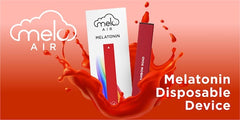In the general debate that’s erupted over the practice of vaping, and specifically, whether or not it's addictive, nearly every argument that you’ll come across focuses on vapes that contain nicotine. There's an apparent reason for that. Nicotine is one of the most addictive substances on the planet.
But what about nicotine-free vapes? Are those addictive, too? More and more, people are turning to non-nicotine vapes in the belief that, because they don't contain nicotine, they can't be addictive.
But is that true? Or could other substances in non-nicotine vapes carry the same potential for addiction as nicotine does?
Let's take a deep dive into the nuances of this question to come up with a better idea of whether or not nicotine-free vapes carry a risk of addiction.
In this article:
- Are nicotine-free vapes addictive?
- How fast can you get addicted to nicotine-free vapes?
- Are 0 nicotine vapes bad for you?
- What are the potential side effects of zero-nicotine vapes?
- Are there healthier alternatives to zero-nicotine vapes?
- What are the potential benefits of nicotine-free vapes?
- Could 0 nicotine vapes help you quit smoking?
- Skip the Nicotine and Satisfy Your Cravings Without Getting Addicted
Are nicotine-free vapes addictive?
It's tough, if not impossible, to make a blanket statement and say that nicotine-free vaping is, or isn't, addictive. That's because there's no one single type of nicotine-free vape. Therefore, there’s no single ingredient list that we can look at to say definitively yes or definitively no; non-nicotine vapes are or aren’t addictive.
For example, a nicotine-free vape could contain a substance like THC. Although most experts say that THC dependence is not on par with what you experience with nicotine addiction (and some experts say it’s not addictive at all), you as an individual could undoubtedly get hooked on the feeling you get from vaping THC.
That's just one example, and we're not trying to pick on THC here. But the point is that you need to pay attention to the ingredients that are in any particular vape to try and determine if there's a risk you could become addicted to it.
Now, let’s pause here for a second. It's also essential to distinguish between a true addiction and a habit.
A true addiction means that your body and mind are dependent on the substance. If you stop taking or using it, you'll suffer from withdrawal symptoms, either physical, psychological, or both.
A heavy drinker who suddenly stops drinking alcohol, for example, can experience hazardous, even life-threatening, physical withdrawal symptoms.
When you vape or smoke cigarettes, you may develop an oral fixation or a hand-to-mouth habit. But this is not a true addiction. Using a non-nicotine vape that contains, for example, melatonin, as MELO diffusers do, carries a very low risk of addiction.
But you might get accustomed to the hand-to-mouth action of inhaling and exhaling from the diffuser. Though it might feel like a mild one, this is not an addiction. It's a habit.
How fast can you get addicted to nicotine-free vapes?
Let’s answer this with a qualification. Most studies show that you can become addicted to vaping reasonably quickly — often within weeks.
However, these studies are based on nicotine vaping, nicotine addiction, and nicotine withdrawal. They don’t examine nicotine-free vaping.
It’s challenging to claim someone can get addicted to nicotine-free vaping because, at least for most nicotine-free e-cigarettes, there’s nothing in them that should be addictive.
Are 0 nicotine vapes bad for you?
As with the addiction statement above, we can't make a single blanket statement and say that zero nicotine vapes are always going to be bad or good for you. That's because the ingredients in your vape juice will determine whether or not any particular vape can harm you.
For example, there are two very well-known and dangerous substances — diacetyl and vitamin E acetate — both of which were once standard in vapes. They have both been shown to cause serious health problems.
Although you'll rarely see them in vapes today, other ingredients may be harmful to you personally. In other words, just because a vape is generally considered safe doesn’t necessarily mean it’s safe for you.
For example, if you're very sensitive to caffeine, you don't want to overdo it with a caffeine vape.
Particular ingredients like that aside, some common ingredients in nearly every vape today — namely vegetable glycerin and propylene glycol — have been cleared by the FDA for human consumption but haven’t been studied regarding their effects when repeatedly inhaled.
Bottom line, nicotine-free vaping is undoubtedly going to be better for you than cigarette smoking and will most likely be better for you than nicotine vaping. For more information on this topic, see our articles on Is 0 Nicotine Vaping Safe? and Safe Vapes with No Nicotine.
What are the potential side effects of zero-nicotine vapes?

There are two groups of potential side effects that you could encounter with nicotine-free vaping.
The first group isn’t unique to non-nicotine vapes but is associated with every type of vape. These are side effects that may come from simply inhaling the vapor that these devices produce. Such side effects might include minor throat or lung irritation and coughing.
The second group of side effects is related to the ingredients in the vape juice. These can include intended side effects, like drowsiness from a vape that contains melatonin (like MELO) or increased energy from a vape that contains caffeine (like HELO).
And then there can be unintended side effects, which are generally going to come to be a concern if you overdo whatever vape you’re using.
So, for example, constantly puffing on a HELO will deliver lots of caffeine into your system. If you're sensitive to it and you use too much of it, you should expect to experience the same kind of side effects that you would experience if you had too much coffee or too many energy drinks.
Are there healthier alternatives to zero-nicotine vapes?
Recognizing that many people, particularly ex-smokers or smokers who are looking to quit, are looking for ways to make healthier choices, a few manufacturers have created devices that mimic certain aspects of smoking and vaping but that do away with nicotine exposure and inhaling a vapor.
We've covered several of these devices here on the blog in the past, particularly in our articles on the Best Vapes Without Nicotine and Vapes with No Nicotine on Amazon.
But to quickly summarize, a device like the Komuso Shift, which is essentially nothing more than a breath-control device, allows you to continue the repetitive, ritualistic hand-to-mouth action and breathing patterns associated with cigarette smoking or vaping but contains no ingredients at all.
You wear the Shift around your neck, and whenever you feel an urge to vape or smoke, you simply bring it to your mouth, inhale and exhale.
The device offers “resistance” to mimic the same breathing pattern you would experience with a vape, but with one big difference — you’re not inhaling anything other than the surrounding air.
The Shift might be a device that would interest you if you want to give up vaping entirely but want some help dealing with any of the associated habits you may have formed.
Finally, you can also accomplish the same breathing patterns by practicing meditation or breathwork.
While this article is not a place to discuss that topic in-depth, many online resources teach meditation techniques and breathing patterns that you can practice independently.
What are the potential benefits of nicotine-free vapes?
There are a few direct and indirect benefits that you might experience with nicotine-free vaping.
Let's start with an indirect benefit: Anytime you use a nicotine-free vape, it means you’re not smoking cigarettes or using a vape that contains nicotine. That means that you're avoiding nicotine intake, which is dangerous all on its own, no matter what form the toxin is in.
A direct benefit that many people get from using nicotine-free e-cigarettes is stress relief. Many people believe that the rhythmic breathing pattern that comes with vaping helps them relax.
As mentioned above, you can accomplish the same thing by learning rhythmic breathing techniques or meditation practices, both of which are available online.
Finally, many people have found that the best vapes without nicotine can help them quit smoking, which brings us to our next section.
Could 0 nicotine vapes help you quit smoking?
Yes! The most significant benefit that most people will get with a 0-nicotine vape is that it can help you stop smoking or help you give up vapes that contain nicotine.
These devices do this by allowing you to continue with the ritualistic aspect of vaping — the repetitive action of bringing something to your mouth, inhaling, exhaling, and doing it over and over again — but without introducing nicotine into the equation.
This setup makes it easier for many people to avoid using more harmful devices.
Skip the Nicotine and Satisfy Your Cravings Without Getting Addicted

As you can see, answering the question, “Is nicotine-free vaping addictive?” requires a nuanced answer. There are certain aspects of vaping, whether the vape contains nicotine or not, that can undoubtedly become habit-forming.
But that doesn't mean you're “addicted” to them. Addiction depends on the ingredients in the vape itself.
Any vape may indeed contain substances that you can become addicted to. This possibility is why, as we always say, it's vitally important that you carefully read the label before you start using any new device.
For more on this, check out our articles on Healthy Vape Alternatives, Are Melatonin Vapes Safe? and Are Caffeine Vapes Safe?




Leave a comment